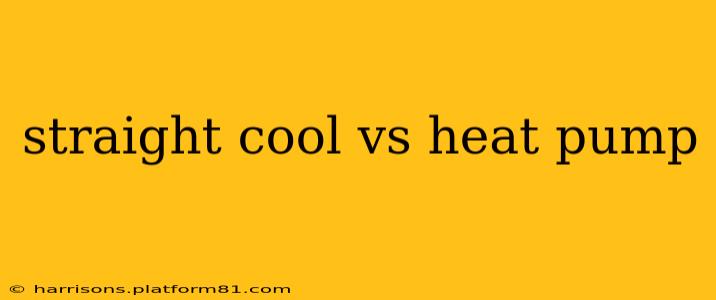Choosing between a straight cool air conditioner and a heat pump can significantly impact your energy bills and comfort levels. Both systems offer cooling, but their heating capabilities differ drastically. This detailed comparison will help you understand the pros and cons of each to make an informed decision.
What is a Straight Cool Air Conditioner?
A straight cool air conditioner, also known as a single-stage air conditioner, is designed solely for cooling. It uses a refrigerant to absorb heat from indoor air and release it outside, lowering the room's temperature. These systems are typically simpler, less expensive to purchase, and easier to install than heat pumps. However, they offer no heating capabilities.
What is a Heat Pump?
A heat pump is a highly efficient system that can both heat and cool your home. Unlike straight cool systems, heat pumps don't generate heat; they move it. In cooling mode, they function similarly to air conditioners. However, in heating mode, they extract heat from the outside air (even in cold temperatures) and transfer it indoors. This makes them a more energy-efficient option for heating than traditional electric resistance heating.
Straight Cool vs. Heat Pump: Key Differences
Here's a table summarizing the key differences:
| Feature | Straight Cool Air Conditioner | Heat Pump |
|---|---|---|
| Primary Function | Cooling only | Heating and Cooling |
| Heating Capability | None | Yes |
| Initial Cost | Generally lower | Generally higher |
| Operating Cost | Can be lower in hot climates | Often lower overall, especially in milder climates |
| Efficiency | Less efficient for heating (none) | More efficient for heating and cooling in many cases |
| Environmental Impact | Higher carbon footprint for heating (if using supplemental heat) | Lower carbon footprint (depending on electricity source) |
What are the Pros and Cons of Each System?
Straight Cool Air Conditioner: Pros and Cons
Pros:
- Lower initial cost: Straight cool systems are typically cheaper to purchase and install.
- Simple operation: They are simpler to operate and maintain.
Cons:
- No heating: They provide only cooling; you'll need a separate heating system.
- Higher operating costs in colder climates: If you live in an area with significant heating needs, the cost of supplemental heating can offset the lower initial cost of the air conditioner.
Heat Pump: Pros and Cons
Pros:
- Heating and cooling: Provides both heating and cooling, eliminating the need for a separate furnace or boiler.
- Energy efficiency: Often more energy-efficient than traditional electric resistance heating, resulting in lower operating costs, especially in milder climates.
- Environmentally friendly: Lower carbon footprint compared to systems relying on fossil fuels for heating.
Cons:
- Higher initial cost: Heat pumps generally have a higher upfront cost than straight cool systems.
- Performance in extreme cold: Efficiency can decrease in extremely cold climates; supplementary heating may be required in very harsh winters.
- More complex system: More complex than a straight cool system, potentially requiring more specialized maintenance.
How Much Does a Straight Cool AC Cost vs. a Heat Pump?
The cost of both systems varies significantly depending on factors like size, features, and installation costs. However, generally, straight cool air conditioners have a lower initial purchase and installation price. Heat pumps typically command a higher initial investment.
Which is Better for My Climate?
The best choice depends heavily on your climate:
- Hot climates with mild winters: A straight cool air conditioner might be sufficient if heating needs are minimal.
- Moderate climates with noticeable heating seasons: A heat pump is generally a more cost-effective and efficient option in the long run.
- Cold climates with harsh winters: A heat pump may still be beneficial but might require supplemental heating in extremely cold conditions. Consider a heat pump with an electric resistance backup.
Are Heat Pumps More Expensive to Run Than Straight Cool AC Units?
While the initial cost is higher for a heat pump, the running costs can be lower, especially if you consider both heating and cooling. In milder climates, the energy savings from efficient heating can significantly offset the cooling costs. In very cold climates, supplemental heating may negate some of those savings.
This comparison provides a general overview. Consult with an HVAC professional to assess your specific needs and determine the most suitable system for your home and climate. They can provide accurate cost estimates and ensure proper system sizing for optimal performance.
